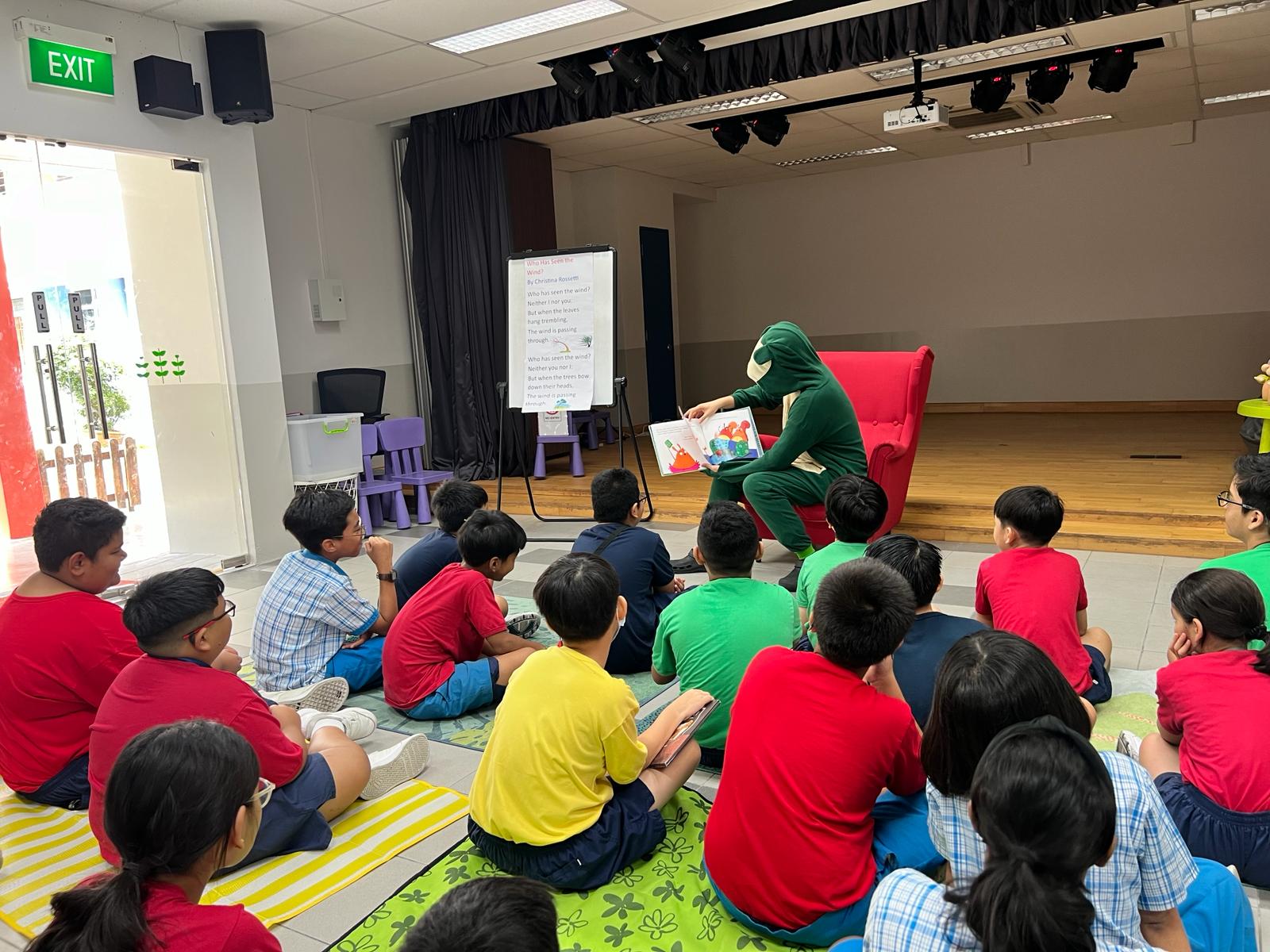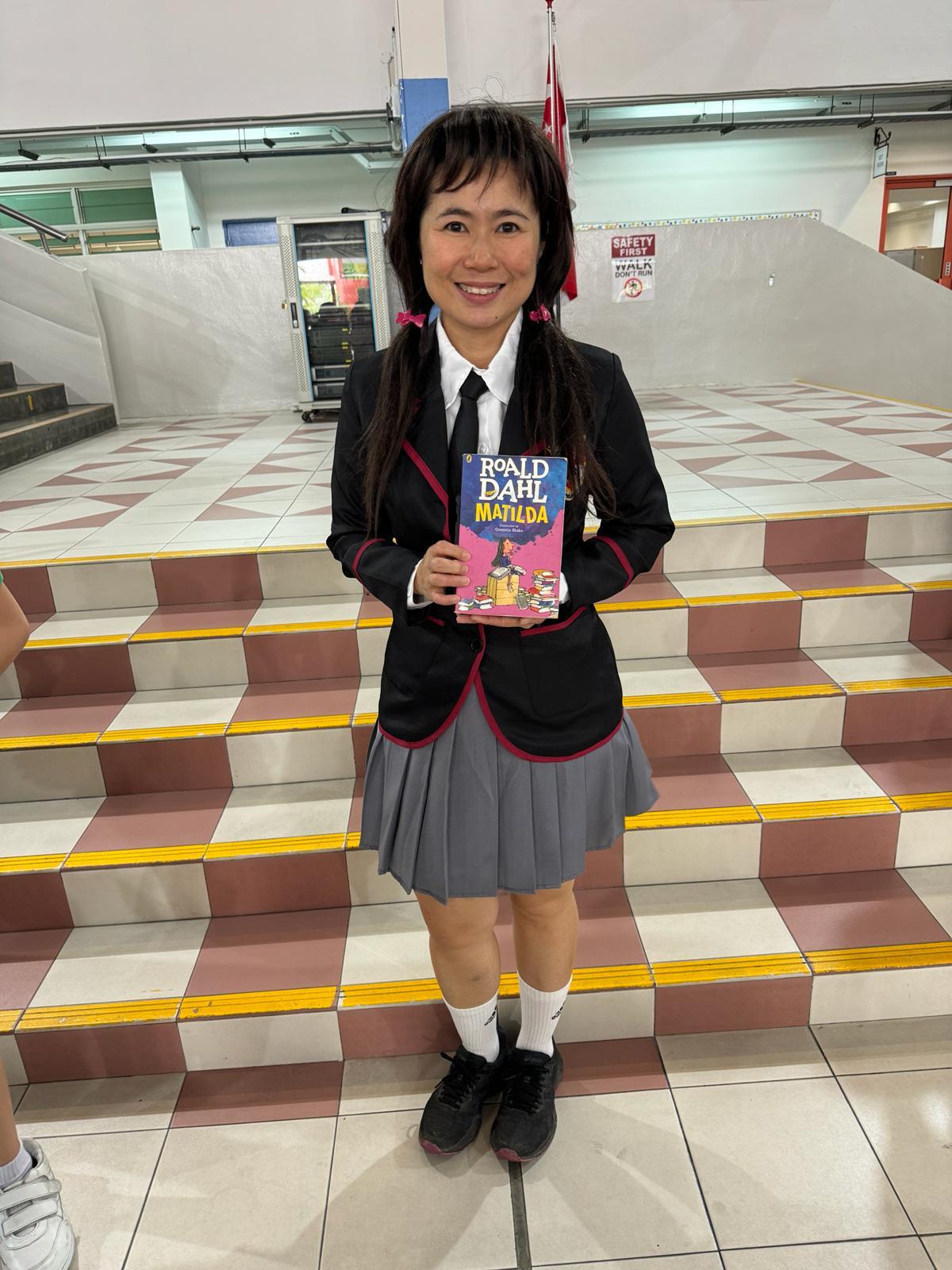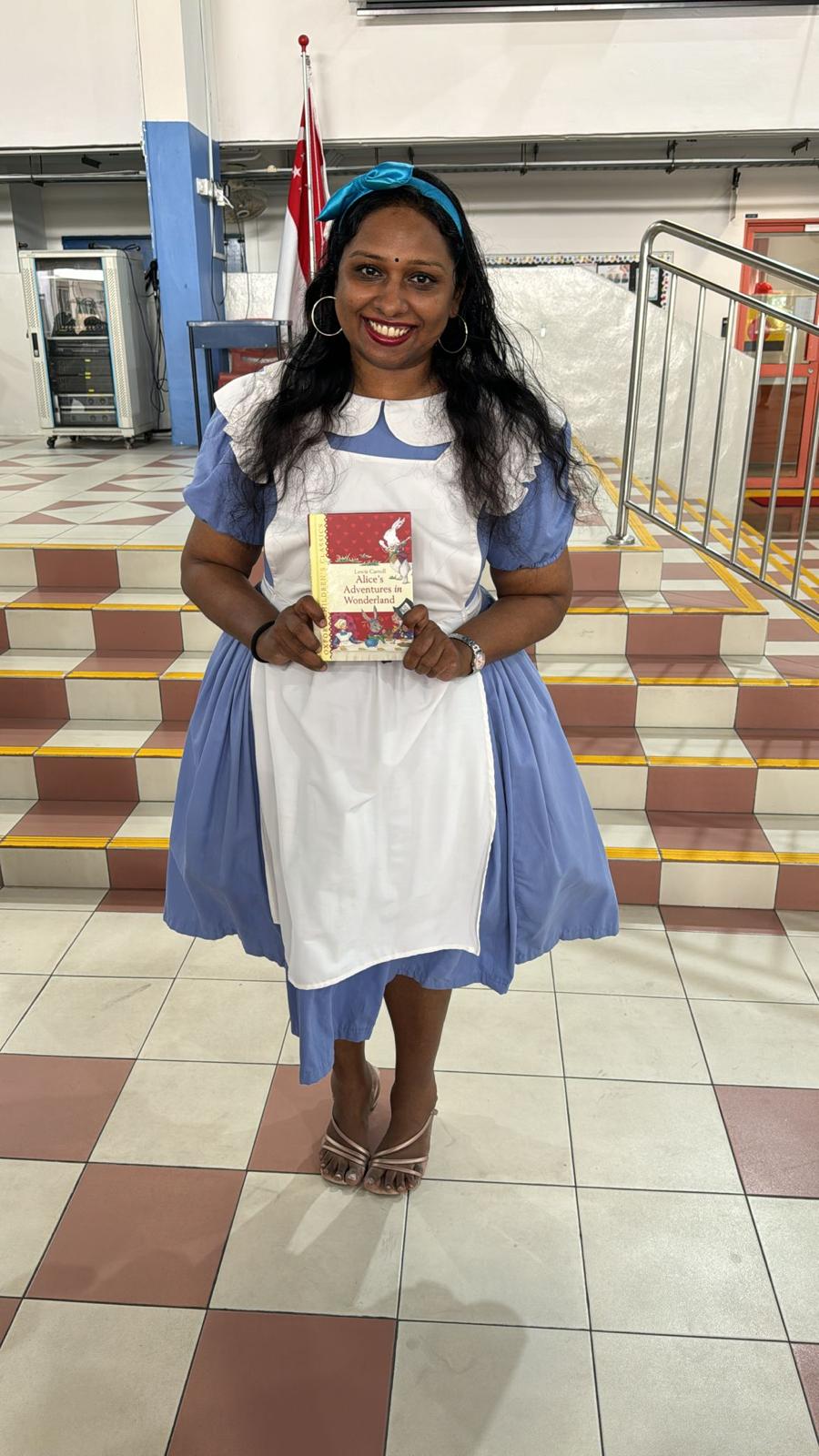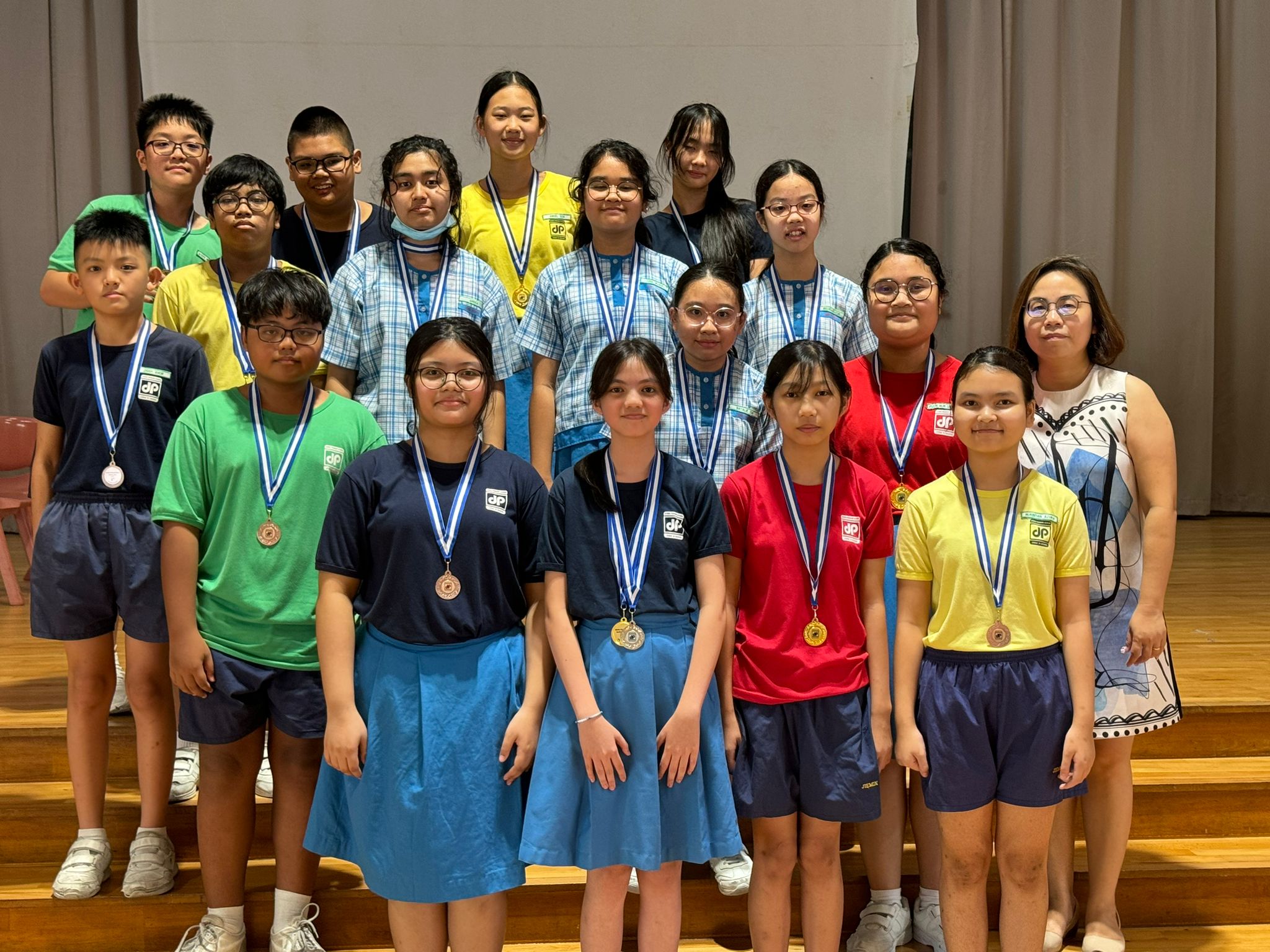English Language
STELLAR 2.0
The STELLAR 2.0 Programme is an updated version of the STELLAR programme, supporting the new English Language Syllabus 2020. It has been revised to better equip learners for changes in language use, such as the increasing importance of linguistic and communication skills, adaptability, and flexibility in a changing global environment. This includes advancements in infomation technology influencing literacy skills and the inclusion of multiliteracies in English. The programme also focuses on preparing learners for future workplace demands, emphasizing interpersonal skills, higher-order cognitive skills, and information systems skills.
While the STELLAR2.0 program fosters a love for reading and a strong English language foundation in students, language learning in the 21st century must encompass various competencies to prepare youth for the digital age. EL teaching practices are being re-evaluated to meet the communication demands of today’s students through the key shifts in ELS2020.
School Support Programs
Learning Support Program 2.0
The Learning Support Programme (LSP) was introduced in all primary schools in 1992 to provide additional support to students lacking in early reading skills. A review in 2005 found that systematic phonics instruction in small groups improved students’ English language and literacy skills. In 2017, the LSP was further aligned with the mainstream EL STELLAR programme. LSP 2.0, piloted in 15 primary schools in 2018 and 2019, showed improved word reading outcomes. It was fully implemented in all primary schools by 2021.
School-based Dyslexia Remediation Program (SDR) 2.0
The school-based Dyslexia Remediation (SDR) programme 2.0 is an intensive literacy intervention for Primary 3 and 4 students with dyslexia. It aims to help students read, spell, and understand texts independently. The programme is evidence-based, focusing on systematic and explicit teaching, practice with feedback, progress monitoring, and differentiated instruction.
Reading Remediation Program (RRP) 2.0
The P3 and P4 Reading Remediation Programme (RRP) targets students struggling with word and text-level literacy. Implemented as a supplementary program, RRP aims to enhance students’ reading fluency and comprehension through 38 sixty-minute sessions per year. Conducted twice weekly in small groups of 10-12 students, the program provides focused support to address individual learning needs and bridge reading gaps effectively.
I-pen Reading Program
The “Reading Begins at Home” programme is a two-year English Language initiative aimed at improving Jieminites’ reading skills through structured activities at home. It focuses on enhancing comprehension, vocabulary, and overall language proficiency by encouraging consistent reading practices. The programme empowers parents to actively support and monitor their children’s reading progress.
A key goal of the programme is to strengthen parent-child relationships through shared reading experiences. By making reading a collaborative family activity, it aims to foster a positive attitude towards reading and learning among children.
The initiative is designed to boost Jieminites’ language skills and reading confidence. Regular parental involvement is expected to cultivate good reading habits, potentially leading to improved academic performance. By providing support at home, the programme aims to motivate children and develop their engagement with English language learning, promoting lifelong reading and critical thinking skills.
KidsRead Club
The KidsREAD program is a dynamic initiative designed to cultivate a profound love for reading among Jieminites and instil enduring, pleasurable reading habits. By immersing Jieminites in weekly interactive reading sessions, the program transforms reading into an engaging, accessible, and positive experience, ultimately bolstering literacy and comprehension skills. The involvement of student volunteers from Yishun Secondary School provides our Jieminites with relatable role models whom our Jieminites could learn from. Hence, promoting peer learning and social interaction across the age groups. This connection between Jieminites and the student volunteers can significantly enhance the younger participants’ motivation, transforming reading from a potentially solitary task into an engaging, collaborative activity. The peer-to-peer interaction creates a dynamic learning environment weekly.
MyOn
The objective of myON is to provide students with a personalized reading experience that aligns with their unique interests, reading levels, and grade levels. By offering a vast library of over 7,000 digital books, it aims to nurture a love for reading, improve literacy skills, and empower students to take charge of their learning journey. The tailored recommendations and close reading tools within myON encourage students to read more frequently and at an appropriate difficulty level, which builds confidence and reading fluency.
Primary 4 and Primary 5 Jieminites are on the myON program. This program has a significant positive impact by fostering higher engagement and motivation to read. By catering to each Jieminite’s preferences and skill level, it caters to the needs of the of the different readers. We hope this program can lead to an increase for the love of reading. The interactive features and supports, such as highlighting and note-taking, can also help Jieminites practice critical reading skills and develop a deeper understanding of texts.
Language Week and Character Day
English Language Week 2024
Jiemin English Language Week aims to ignite a passion for English among Jieminites. This dedicated week creates an immersive environment filled with diverse, interactive activities tailored to various learning preferences. These engaging events are crafted to boost language proficiency while encouraging Jieminites to learn English through enjoyable and imaginative means.
 Our VP, Ms Wong, sharing an exciting story during recess.
Our VP, Ms Wong, sharing an exciting story during recess.
 Our mystery reader, sharing a story with the pupils during recess. (Can you guess who he is?)
Our mystery reader, sharing a story with the pupils during recess. (Can you guess who he is?)
The week features a range of activities, including dynamic EL storytelling sessions and entertaining library games. These hands-on experiences offer Jieminites practical opportunities to use and appreciate English in lively, engaging ways. The overarching aim is to cultivate a genuine appreciation for the language, empowering Jieminites to become self-assured and eager communicators.
In essence, English Language Week serves as a vibrant celebration of English, striving to nurture lifelong language enthusiasts and learners.
Character Day 2024
 |
 |
 |
|---|---|---|
| Mulan and Captain Jack Sparrow in Action! | Our Matilda! | Dr. Seuss in our school! |
 |
 |
 |
|---|---|---|
| Hi there, ‘Mr Fox’! You are fantastic! | The farmer bringing his goose and the golden eggs around! | Alice in JieminLand! |
Character Day added an extra layer of excitement to the school’s literary focus. English teachers transformed themselves into beloved storybook characters, bringing literature to life in a tangible way. Jieminites were treated to animated storytelling sessions featuring teachers embodying an array of characters from both classic and contemporary literature. This creative approach, featuring everything from fairy tale protagonists to intrepid explorers, made stories more engaging and accessible. The teachers’ enthusiasm and performances inspired Jieminites to explore new books and immerse themselves more deeply in the world of reading.
English Enrichment Programs
P1 Choral Reading
Choral Reading for Primary 1 Jieminites aims to nurture confident communicators through engaging and interactive techniques. By employing Antiphonal and Cumulative reading methods, Jieminites learn to read aloud in unison and build upon each other’s voices, fostering teamwork and mutual support. We have incorporated environmental themes, to spark interest in both reading and current issues. Through regular practice, Jieminites can develop improved articulation, expression, and voice projection. This holistic approach not only enhances their reading skills but also builds self-assurance in public speaking. As Jieminites explore various texts together, they cultivate a lasting enthusiasm for reading. Adaptive and critical thinking skills will be developed as they get to analyse and interpret different scripts, considering the environmental themes and how best to convey them through their performances. This approach aligns with the e-21st Century Competencies (e-21st CC) framework, emphasising the importance of these cognitive skills in today’s rapidly changing world. of the program, we hope the Jieminites can express their thoughts clearly and articulate speech with intonation and expression.
P2 Speech and Drama
Speech and Drama for Primary 2 Jieminites aims to nurture confident communicators through elements of drama such as dramatization, characterization, and vocalization. We seek to build their confidence in presenting their works to a live audience. We believe that Jieminites will develop critical thinking skills as they analyse environmental issues and consider how to effectively communicate them through drama. This aligns with the e-21st Century Competencies framework, encouraging Jieminites to think deeply about complex topics and express them creatively. The program also fosters adaptive thinking, as Jieminites learn to adjust their performances based on audience reactions and feedback. This skill is crucial in the e-21st CC framework, preparing Jieminites to navigate and respond to changing situations effectively. We aim to develop confident speakers who can express their thoughts and feelings clearly, use facial expressions to convey character emotions, intonate and articulate speech, share and build on ideas respectfully, dramatize texts, and project their voices to the audience.
P3 Puppetry
Puppetry for Primary 3 Jieminites aims to teach P3 Jieminites puppetry elements such as puppet manipulation, characterization, and handling. It also seeks to build their skills in presenting their works to the class while incorporating different environmental issues as the central theme in the puppetry lessons. Aligning with the e-21st Century Competencies (e-21st CC) framework, we hope to foster critical thinking as Jieminites analyse environmental issues and creatively express them through puppetry. It also develops adaptive thinking skills, as they learn to adjust their performances based on audience reactions and peer feedback. Jieminites will not only enhance their communication skills but also develop a deeper understanding of environmental issues. This experience can build greater confidence and creativity, which are valuable life skills. Additionally, the durable puppets can serve as lasting educational tools that Jieminites can use in future presentations and projects, further reinforcing their e-21st CC skills.
P4 Public Speaking
Public Speaking for P4 Jieminites aims to build confidence in public speaking, a vital skill offering three key advantages that align closely with e-21st Century Competencies. We hope each P4 Jieminte is able to effectively convey their messages and engage their audience, enhancing their communication skills. This aligns with the e-21st CC focus on clear and expressive communication, preparing Jieminites to articulate complex ideas in various contexts. We believe that a confident P4 Jieminte can also develop their self-awareness and self-management skills as a confident public speaker. By confidently presenting on environmental topics, P4 Jieminites can develop a deeper understanding of global issues and their role in addressing them, fostering responsible decision-making and active citizenship. The process of developing public speaking skills inherently cultivates other e-21st CC competencies. As our Jieminite prepare and deliver speeches, they enhance their critical and inventive thinking skills, learning to analyse information, generate ideas, and adapt their presentations based on audience feedback. This iterative process of improvement aligns perfectly with the adaptive thinking skills emphasised in the e-21st CC framework, preparing Jieminites to navigate the complexities of an ever-changing world with confidence and competence.
School Competitions
Spelling Bee
 P6 Prize Winners 2024
P6 Prize Winners 2024
 P5 Prize Winners 2024
P5 Prize Winners 2024
The Jiemin Spelling Bee is an engaging event designed to cultivate a love for language while enhancing Jieminites’ vocabulary, spelling, and comprehension skills. This competition goes beyond merely identifying top spellers; it challenges students to push their boundaries, build confidence, and develop a spirit of healthy competition.
To ensure inclusive participation, preliminary rounds were conducted in each classroom using Kahoot!, a digital platform that aligns with the 21st CC of digital literacy. This approach allowed teachers to assess spelling abilities in a familiar environment while introducing an element of technology-enhanced learning. The finals was then held in the school hall, where they competed before an audience of fellow Jieminites and teachers.
The Spelling Bee’s impact on Jieminites was multifaceted, touching on several 21st CC: Communication, Collaboration, and Information Skills such as enriching vocabulary and improving language proficiency,developing information processing skills through rapid word recognition. At the same time, it boosts self-esteem through public speaking and performance.
The event fostered a strong sense of school spirit as Jieminites enthusiastically cheered for the participants. Many participants expressed excitement and enjoyment throughout the competition, feeling both supported and motivated. The Spelling Bee transformed into a memorable experience that seamlessly blended learning with fun, leaving a lasting impact on students’ confidence and enthusiasm for the English language.
Internal Writing Competition
The Internal writing competition at Jiemin Primary School offers a valuable platform for nurturing budding writers and fostering a culture of literary excellence. These events provide Jieminites with regular opportunities to develop their creativity in a supportive, familiar environment. By participating in these competitions, Jieminites can experiment with various writing styles, genres, and themes without the added pressure of external judgement. This freedom to explore and take risks in their writing is crucial for developing confidence and finding their unique voice. Moreover, the consistent practice of writing for these competitions helps Jieminites refine their skills, improve their vocabulary, and enhance their ability to structure compelling narratives.
The feedback and recognition received from these internal competitions serve as powerful motivators for Jieminites to continue honing their craft. Constructive critiques from teachers and peers provide valuable insights for improvement, while accolades for outstanding work boost confidence and encourage further literary pursuits. As Jieminites see their progress over time, they are more likely to view writing as an enjoyable and rewarding activity rather than a daunting task. This positive association with writing, coupled with the regular practice and feedback loop established through these competitions, lays a solid foundation for Jieminites to become prolific writers. The skills and habits developed through these internal events prepare students not only for external competitions but also for a lifetime of effective communication and creative expression.
Internal writing competition winners:
| Name | Class |
|---|---|
| Kyra Lavin | 3 Diligence |
| Ng Jun Yu | 3 Diligence |
| Jayden Lim | 4 Care |
| Amber Wong | 4 Joy |
| Alyssa Goh | 5 Diligence |
| Kayden Loh | 5 Diligence |
| Han Renhao | 6 Diligence |
| Adhwa Binte Amirul Haque | 6 Kindness |
National Competition
The National English Writing Competition (NEW-C), organized by the Singapore Young Writers Press, is an on-the-spot writing event for students aged 8 to 12, aimed at showcasing writing by children, for children. Jiemin takes great pride in its annual participation in this competition, which serves as a platform for Jieminites to showcase their writing prowess. The event offers students a valuable opportunity to hone their skills in producing high-quality written work. The prospect of having their stories published in JPS Budding Writers or recognised not only instils a sense of pride and achievement but also acts as a powerful motivator for Jieminites to further explore and develop their creative talents. This public acknowledgement of their work among peers fosters a supportive environment that celebrates literary accomplishments.
Moreover, the competition encourages Jieminites to delve deeper into their creativity, employ critical thinking, and refine their narrative skills. By engaging with the work of fellow young writers, students gain exposure to diverse writing styles and perspectives, which in turn inspires them to elevate their own literary craftsmanship. We hope this competition plays a crucial role in helping young writers recognise the significance of their storytelling abilities, thereby cultivating a lifelong passion for the written word.
YMCA Plain English Speaking (PESA) Competition
The YMCA Plain English Speaking Awards (PESA) 2024, organized by the YMCA of Singapore in collaboration with the Ministry of Education and the Speak Good English Movement, emphasizes the skill of delivering a clear and persuasive message to an audience with sincerity and appropriate language. Successful speakers will showcase their unique voice and style. Detailed qualities of “Plain English Speaking” are outlined in this kit.
The YMCA Plain English Speaking Awards (PESA) 2024 aims to promote public speaking in Plain English as a crucial social and academic skill. It offers students a platform to enhance their speaking abilities and build confidence in public presentations. Additionally, it provides an opportunity for students to learn by observing proficient speakers. Jiemin Primary School is proud to have several Jieminites participating in this prestigious competition, demonstrating their commitment to developing strong communication skills.
Proficient speakers, like those showcased in PESA, offer numerous advantages that align with the goals of Jiemin Primary School and the e-21st Century Competencies framework:
1. Effective communication: They can articulate complex ideas clearly and concisely, a crucial skill in academic and professional settings.
2. Confidence building: Their ability to speak confidently inspires others and boosts their own self-esteem.
3. Critical thinking: Proficient speakers demonstrate the ability to analyse information and present logical arguments.
4. Adaptability: They can adjust their speaking style to suit different audiences and contexts, showcasing adaptive thinking skills.
5. Leadership potential: Strong public speaking skills often correlate with effective leadership abilities.
6. Global awareness: Through their presentations, proficient speakers often demonstrate knowledge of diverse topics, including global issues.
7. Persuasion and influence: They can effectively convince others and inspire action, particularly important when addressing critical issues.
Budding Writer
Each year, JPS “Budding Writer” book showcases the exceptional writing talents of our young Jieminites, with each English teacher submitting an entry from their class. This initiative provides an exciting platform for Jieminites to see their work published, sparking a newfound enthusiasm for writing. For Jieminites, having their pieces featured boosts confidence, affirming their hard work and inspiring them to further develop their writing skills. It also encourages a healthy sense of competition and camaraderie as Jieminites support and celebrate each other’s accomplishments.
In addition to recognizing individual talent, the Budding Writer book elevates the JPS literary reputation. It shines a spotlight on our Jieminites ‘ creativity and dedication, attracting attention and fostering pride within the JPS community. The book also includes works from the school’s top writers, who go on to represent JPS in the National English Writing Competition (NEW-C), organized by Singapore Young Writers Press. Participation in NEW-C not only gives our Jieminites` exposure at a national level but also highlights our JPS commitment to fostering literary excellence. This annual publication has become a cornerstone of our English program, creating a legacy of young writers inspired to express, create, and excel.

